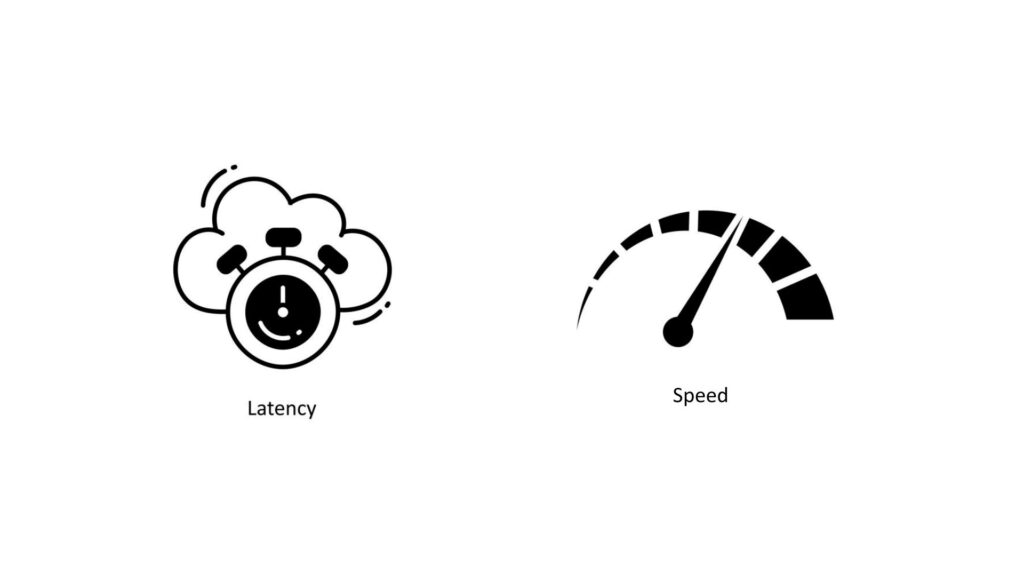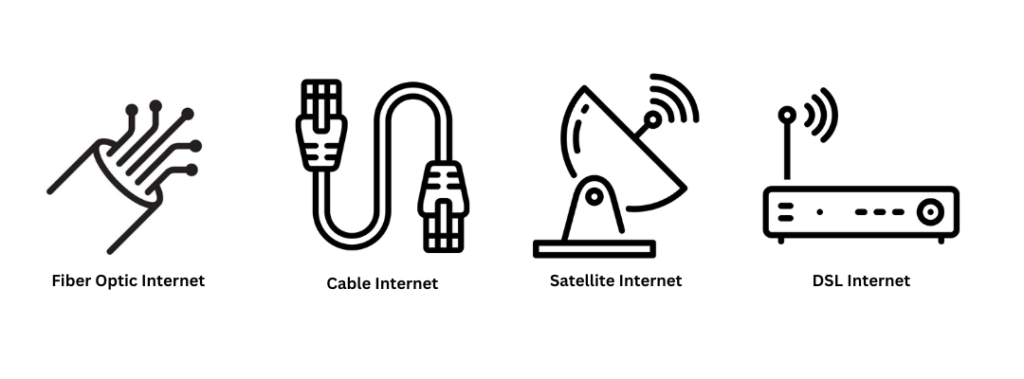Introduction
Do you get stuck in the game and unable to move for seconds? Or does your game feel sluggish and slow? The reason is a slow internet connection. But don’t worry. We are here to help. If you want to enjoy a smooth and enjoyable gaming experience, you will need a good internet plan that will provide you with both high speed and low latency. In this guide, we will talk about how to choose a good internet plan to get rid of lag and level up your gaming. Let’s dive in.
Understanding Ping and Speed
When it comes to online gaming, there are two key internet performance factors that come into play: speed and latency. It is also known as ping. Let’s break down what each means and how they affect your gameplay.
- Latency (Ping): This one is measured in milliseconds (ms), ping shows the time it takes for data to travel from your device to the game server and back. A lower ping means a faster connection, resulting in quicker in-game responses and smoother gameplay. On the other hand, high ping leads to lag and delays, hindering your performance and reaction time.
- Speed: It is measured in megabits Mbps, internet speed talks about how fast data can be transferred to and from your device. Higher Mbps translates to faster downloads and uploads. In the gaming world, speed is crucial for downloading game updates, uploading content, and streaming games without buffering.
Ideal Ping and Speed Requirements for Different Types of Games
| Game Type | Ping Requirement | Speed Requirement |
| Fast-paced shooters | Very Low (< 30 ms) | High (> 50 Mbps) |
| MOBAs | Low (30-50 ms) | Moderate (25-50 Mbps) |
| RPGs | Moderate (50-80 ms) | Moderate (25-50 Mbps) |
| MMOs | Acceptable (80-100 ms) | High (> 50 Mbps) |
| Call 866-861-4084 for Internet Deals |
Top Internet Providers for Gaming
The best internet provider for gaming depends heavily on your location. So always check availability and compare plans in your specific area. With that said, here are some internet providers known for their strong performance in gaming
- Google Fiber: Offers incredibly fast speeds and low latency, making it an excellent choice for gamers.
- Verizon Fios: Another fiber optic option with a reputation for reliable service and low ping.
- Xfinity: A widely available option with generally good speeds and decent latency.
- Spectrum: Offers competitive plans and widespread coverage.
- AT&T Fiber: Provides fiber internet in select areas, offering fast speeds and low latency.
| Provider | Speed (Mbps) | Ping (ms) | Data Cap | Additional Features |
| Google Fiber | 1000-8000 | Low | Unlimited | Wi-Fi included, professional installation |
| Verizon Fios | 300-2300 | Low | Unlimited | TV packages available, strong customer service |
| Xfinity | 50-1200 | Moderate | 1200 GB | Bundled services, extensive coverage |
| Spectrum | 100-1000 | Moderate | 1200 GB | TV and phone packages, mobile app |
| AT&T Fiber | 300-5000 | Low | Unlimited | TV and phone packages, home security |
Key factors to consider when choosing a provider:
- Speed: Look for plans with higher speeds because it’s better for gaming.
- Latency (ping): Lower ping is better for online gaming.
- Data caps: Avoid plans with data caps, especially if you are a heavy gamer.
- Reliability: A consistent internet connection is crucial for smooth gameplay.
- Cost: Compare prices and available plans to find the best value for your needs.
| 💡 Pro Tip: Remember to check for internet providers available in your area and compare their plans based on speed, latency, price, and customer reviews. |
Best Internet Connection for Gamers
- Fiber Optic Internet: Fiber optic internet is like a superhighway for your data. It’s super fast and has a very low lag. This means games load quickly, and you can react faster. Plus, it’s usually very reliable, so you won’t get annoying disconnects. If it’s available in your area, fiber optic is often the best choice for gamers.
- Cable Internet: Cable internet is another popular option. It’s generally faster than DSL and offers decent speeds for gaming. However, it can be less reliable than fiber optic, and your speed might slow down during peak times when lots of people are using the internet.
- DSL Internet: Suitable for Casual Gamers or Limited Options: DSL internet uses your phone line to connect to the internet. It’s usually slower than cable or fiber optic, and you might experience lag, especially during fast-paced games. It’s okay for casual gamers or people who have limited options.
- Satellite Internet: Satellite internet is an option for people who live in rural areas where other internet options aren’t available. However, it usually has high lag (ping) and slower speeds compared to other options. This can make online gaming difficult, especially for fast-paced games.
How to Reduce Latency (Lag)
Lag, or latency, is the annoying delay between your actions in a game and what you see on screen. Here is how you can reduce it:
- Wired Connection: Use an Ethernet cable to connect your gaming device directly to your router. This is the most reliable way to get a strong internet connection.
- Router Placement: Place your router in a central location, away from walls and other electronic devices. This helps improve Wi-Fi signal strength.
- Router Updates: Keep your router’s firmware updated. This can improve performance and fix bugs.
- Check for Interference: Other devices like cordless phones or microwaves can interfere with your Wi-Fi signal. Try to keep them away from your router.
- Close Unnecessary Programs: Other programs running on your computer can slow it down. Close any programs you’re not using.
- Update Drivers: Make sure your graphics card and network drivers are up-to-date.
- Game Settings: Adjust your game’s graphics settings to improve performance. Lowering settings can sometimes reduce lag.
- Server Location: If possible, choose a game server that is physically closer to you. This can help reduce ping.
- Server Load: Avoid servers that are overcrowded. A high server load can increase latency.
Mobile Gaming
Mobile gaming has become super popular because it lets people play games anytime, anywhere. All thanks to the technology. Well, imagine being bored on a bus or waiting in line, and you can just pull out your phone or tablet and start playing!
Why is it so popular?
- Convenience: Games are always in your pocket.
- Variety: There’s a game for everyone, from puzzle games to action adventures.
- Free to play: Many games don’t cost anything to start playing.
- Social: You can play with friends or meet new people online.
Tips for Mobile Gaming
- Watch out for data: Some games use a lot of data, so be careful if you’re on a limited plan.
- Take breaks: Gaming can be addictive, so make sure to rest your eyes and hands.
- Protect your phone: Use a case to keep your phone safe from drops.
- Manage your time: It’s easy to lose track of time, so set limits for yourself.
Final Verdict
Choosing the right internet plan is important for an optimal gaming experience. By understanding the importance of speed and ping, considering factors like data caps and upload speeds, and selecting a plan that suits your gaming needs, you can significantly improve your gameplay.
Frequently Asked Questions (FAQs)
What is the difference between ping and internet speed?
Ping refers to the time it takes for data to travel between your device and a server. Lower ping means less lag. Speed refers to how fast data can be transferred.
What is the best internet service type for gaming?
Fiber optic is generally the best, followed by cable. DSL and satellite are less ideal for gaming.
Are there any internet providers in the US that are particularly good for gaming?
While specific recommendations depend on location, major providers like Comcast, Spectrum, AT&T, and Verizon often offer plans suitable for gamers.
How can I find out the good internet plan available in my area?
Use online tools like speed tests and internet provider comparison websites to find options in your specific location.
What can I do to improve my gaming experience if I have a good internet plan?
Use a wired connection, optimize router placement, consider a gaming router, and keep your equipment updated.

Meet Jennifer Harper, a wordsmith extraordinaire who has been shaping the digital landscape with her creative prowess for the past two years. Not just a content writer; she is a storyteller who brings the content to life. Her passion for internet trends, memes, and the ever-evolving world of entertainment is evident in every piece she creates. Jennifer doesn’t just follow trends; she sets them.

